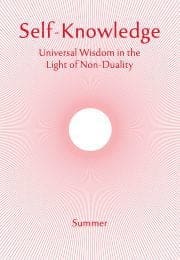Your Real Nature is Perfection
That is perfection, this is perfection.
Out of perfection comes forth perfection.
When perfection is removed from perfection
Perfection alone remains.
This verse comes from the Brihadaranyaka Upanishad. It was revealed by an enlightened seer of Truth. These words indicate non-duality—the direct experience of ultimate reality. This experience is not something that comes and goes. Once realised it is everlasting and never separate from one's own Self.
This is one view of the meaning of perfection, but we may well feel it should be challenged because it is so abstract and unconventional. Is this really the truth about human nature? In fact, when we look at human nature as it is and how it manifests in this world, we may be tempted to believe the words of Edgar Allan Poe, who said:
I have no faith in human perfectibility. I think that human exertion will have no appreciable effect upon humanity. Man is now only more active—not more happy nor more wise—than he was 6000 years ago.
There is a subtle point at issue here. If we look at the human body and the human mind—what we generally think ourselves to be—it is clear that there is no enduring perfection in this world of change, simply because it is ever changing. Shakespeare was surely right when he wrote in his fifteenth sonnet:
When I consider everything that grows
Holds in perfection but a little moment,
That this huge stage presenteth naught but shows
Whereon the stars in secret influence comment...
The idea that Shakespeare is expressing is that there are moments of perfection, when things in nature and even in human activities seem to touch a height of beauty or mastery, such as the perfect rose, the sublime piece of music which absorbs our attention so completely that we forget the passing time, the flawless sporting manoeuvre. But these are all transient experiences. They pass. We may have a desire to say to the passing moment: 'Stay, you are so wonderful', but the moment does not stay, and we find ourselves again in this world of imperfection, incertitude and struggle.
Yet we all have an affinity with perfection, and it pervades our outlook. It comes through in our fussiness about the way we like things to be—and we all have our deeply personal ideas about what is right for us. There is a real sense in which we feel that we are greater than we seem to be. None of us likes to be personally criticised. We may apparently welcome and make a constructive use of the criticisms that inevitably meet us as we develop skills in the world. But our deepest hope is that we shall find ourselves in a position that is totally beyond criticism.
Subscribe or enrol for free guest access to read all of this article and Self-Knowledge online.


